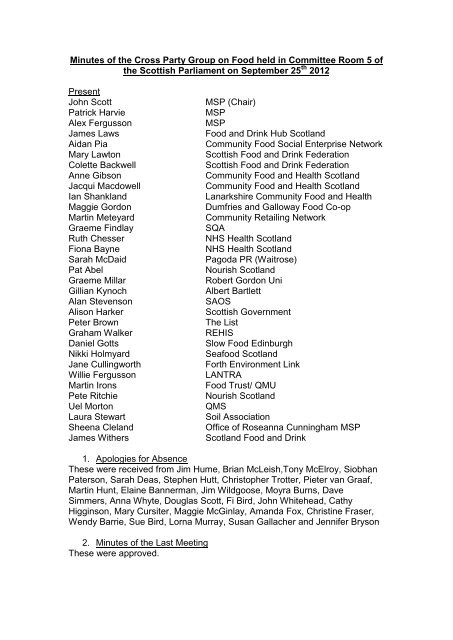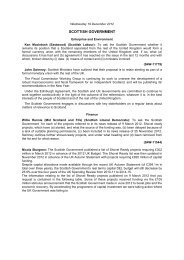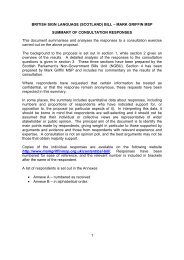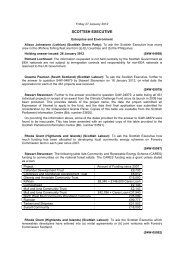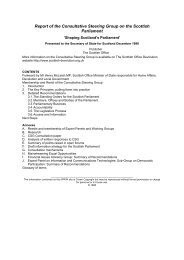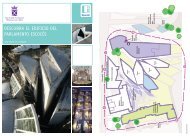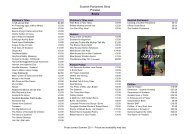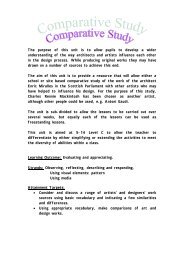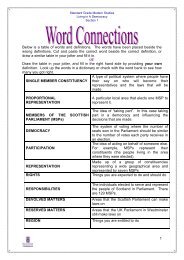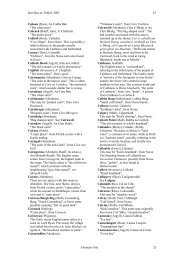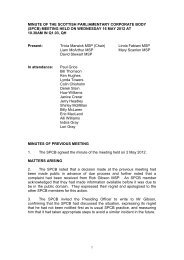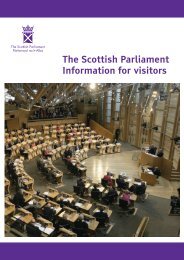Minutes of Meeting 25 September 2012 - Scottish Parliament
Minutes of Meeting 25 September 2012 - Scottish Parliament
Minutes of Meeting 25 September 2012 - Scottish Parliament
You also want an ePaper? Increase the reach of your titles
YUMPU automatically turns print PDFs into web optimized ePapers that Google loves.
<strong>Minutes</strong> <strong>of</strong> the Cross Party Group on Food held in Committee Room 5 <strong>of</strong><br />
the <strong>Scottish</strong> <strong>Parliament</strong> on <strong>September</strong> <strong>25</strong> th <strong>2012</strong><br />
Present<br />
John Scott MSP (Chair)<br />
Patrick Harvie MSP<br />
Alex Fergusson MSP<br />
James Laws Food and Drink Hub Scotland<br />
Aidan Pia Community Food Social Enterprise Network<br />
Mary Lawton <strong>Scottish</strong> Food and Drink Federation<br />
Colette Backwell <strong>Scottish</strong> Food and Drink Federation<br />
Anne Gibson Community Food and Health Scotland<br />
Jacqui Macdowell Community Food and Health Scotland<br />
Ian Shankland Lanarkshire Community Food and Health<br />
Maggie Gordon Dumfries and Galloway Food Co-op<br />
Martin Meteyard Community Retailing Network<br />
Graeme Findlay SQA<br />
Ruth Chesser NHS Health Scotland<br />
Fiona Bayne NHS Health Scotland<br />
Sarah McDaid Pagoda PR (Waitrose)<br />
Pat Abel Nourish Scotland<br />
Graeme Millar Robert Gordon Uni<br />
Gillian Kynoch Albert Bartlett<br />
Alan Stevenson SAOS<br />
Alison Harker <strong>Scottish</strong> Government<br />
Peter Brown The List<br />
Graham Walker REHIS<br />
Daniel Gotts Slow Food Edinburgh<br />
Nikki Holmyard Seafood Scotland<br />
Jane Cullingworth Forth Environment Link<br />
Willie Fergusson LANTRA<br />
Martin Irons Food Trust/ QMU<br />
Pete Ritchie Nourish Scotland<br />
Uel Morton QMS<br />
Laura Stewart Soil Association<br />
Sheena Cleland Office <strong>of</strong> Roseanna Cunningham MSP<br />
James Withers Scotland Food and Drink<br />
1. Apologies for Absence<br />
These were received from Jim Hume, Brian McLeish,Tony McElroy, Siobhan<br />
Paterson, Sarah Deas, Stephen Hutt, Christopher Trotter, Pieter van Graaf,<br />
Martin Hunt, Elaine Bannerman, Jim Wildgoose, Moyra Burns, Dave<br />
Simmers, Anna Whyte, Douglas Scott, Fi Bird, John Whitehead, Cathy<br />
Higginson, Mary Cursiter, Maggie McGinlay, Amanda Fox, Christine Fraser,<br />
Wendy Barrie, Sue Bird, Lorna Murray, Susan Gallacher and Jennifer Bryson<br />
2. <strong>Minutes</strong> <strong>of</strong> the Last <strong>Meeting</strong><br />
These were approved.
3. Matters Arising<br />
There were no matters arising, all actions had been completed.<br />
4. Spaghetti Junction: Hubs and Networks linking private, public and third<br />
sector interests<br />
James Laws (JL) Business Development and Support Director <strong>of</strong> the Food<br />
and Drink Hub Scotland gave a presentation, which is attached to the<br />
minutes.<br />
Aidan Pia (AP) Executive Director <strong>of</strong> Senscot then gave a presentation on the<br />
new Community Food Social Enterprise Network.<br />
Senscot were set up in 1999 to connect social entrepreneurs and social<br />
enterprises to help make them more effective. They have 3 key activities:<br />
� Connecting and informing social entrepreneurs<br />
-Circulation <strong>of</strong> weekly Bulletin / use <strong>of</strong> website<br />
� Facilitating Networks –broad spread urban/rural both geographic and<br />
thematic<br />
� Developing the Sector<br />
- work with others to incubate and spin out new services – as with<br />
Scotland unLtd, DTA Scotland, the Social Enterprise Academy and<br />
First Port, influence policy and raise awareness.<br />
The Community Food SEN was set up following a meeting at Community<br />
Food and Health Scotland where interest in establishing the network was<br />
highlighted and research by QMU suggested there was a growing interest in<br />
social enterprise in the community food sector.<br />
Similar Senscot thematic networks have established roundtables where<br />
network members and members <strong>of</strong> public agencies meet quarterly and these<br />
have been successful.<br />
<strong>Scottish</strong> Government is supportive <strong>of</strong> the network approach as through<br />
support and access to programmes social enterprises can grow and it is free.<br />
It also means there is a voice in policy such as the Procurement Reform Bill.<br />
AP recognised the challenges – there are a lot <strong>of</strong> existing networks in food<br />
and drink so there is a cluttered landscape to work in.<br />
Open Debate<br />
John Scott MSP asked if the hub was increasing viability <strong>of</strong> MSMEs. JL said<br />
that this was true, that companies had increased access to markets and they<br />
benefitted from this. If the hub broke even that was fine, as they hoped to see<br />
revenue in the future. He gave an example <strong>of</strong> work he was doing with a<br />
tomato grower –the only one in the Clyde valley –for no cost.
Nicki Holmyard Seafood Scotland asked whether they were doing anything<br />
with fish. JL said they were engaged with some salmon producers and he was<br />
meeting with Seafood Scotland. Nicki said in particular she was interested in<br />
how they could help smaller inshore companies. JL noted that he was on the<br />
board <strong>of</strong> the <strong>Scottish</strong> Shellfish Marketing group and had good contacts in the<br />
sector.<br />
Laura Stewart Soil Association Scotland asked if they were involved in<br />
distribution for food service, particularly the public sector. JL said yes this was<br />
one <strong>of</strong> the foci for year 2 and 3. There were definite opportunities but it took<br />
time to co-ordinate. He had been involved in local food for many years and he<br />
felt this experience would be useful.<br />
Pete Ritchie Nourish Scotland said that community housing pioneers had<br />
noted the need for a new approach, had big ideas but these had taken time to<br />
get movement and wondered what learning there was from that sector. AP felt<br />
that there was a need to link up more to create opportunities and by coming<br />
together communities could be stronger. Pete asked about food and its place<br />
in the private sector. AP said there were 30 community cafes in Edinburgh<br />
and wondered how many were supplied by community food growers. He said<br />
the transition to a social enterprise took time and a culture change.<br />
Jane Cullingworth Forth Environment Link asked about the hubs business<br />
model. JL said they were a private company. Other models had been looked<br />
at but this model was thought to be best for the quick moving environment.<br />
None <strong>of</strong> the retailers they dealt with currently were social enterprises.<br />
Patrick Harvie MSP asked about suppliers. JL said if retailers dealt with<br />
wholesalers, margins then came in and this was less competitive for them.<br />
The hub built up a relationship with their companies and helped co-ordination.<br />
Another issue was the ability to have a single point <strong>of</strong> invoicing. Many big<br />
distributors want pallets <strong>of</strong> product but the hub could hold small amounts <strong>of</strong><br />
stock for example casks/bottles.<br />
Willie Fergusson LANTRA asked about the principle behind the hub and any<br />
thoughts they had on skills gaps. JL said that the hub never takes ownership<br />
<strong>of</strong> any <strong>of</strong> the businesses, just advises. He found that it was commercial<br />
knowledge that was missing –understanding costs and buyers expectations.<br />
They <strong>of</strong>ten needed technical help also on such things as life testing and bar<br />
coding. Often people were afraid <strong>of</strong> producing large volumes.<br />
Colette Backwell SFDF said that there was a huge expectation that the third<br />
sector would take on more and more as contract and asked to what extent<br />
public sector expectations met the skills in the third sector. AP said that was<br />
increased awareness in the public sector <strong>of</strong> what the third sector can <strong>of</strong>fer. He<br />
thought there was a willingness to engage and be flexible with split tenders.
There was an issue <strong>of</strong> capacity and capability and there was a need to<br />
demonstrate collaboration. AP thought about 20% <strong>of</strong> social enterprises were<br />
developed enough/at the right stage in terms <strong>of</strong> maturity, size skills etc to be<br />
ready to tender or fully engage with procurement opportunities. He thought<br />
there were also issues in consistency <strong>of</strong> approach at Local Authority level.<br />
Alex Fergusson MSP asked what triggered the hub into action. JL said there<br />
were various triggers. Waitrose had identified gaps and asked for help.<br />
Suppliers had asked for help in delivering and small businesses in accessing<br />
markets. In particular the hub spent time understanding and working with<br />
companies especially micro ones. He noted that many had never talked to<br />
their business gateway –he now had built up good contacts with Lanarkshire.<br />
He was currently working with QMU on how to get an “idea to the plate” –<br />
looking at the costs and how to get through the various hoops.<br />
Ian Shankland LCFH noted the approach to the hub. Community food cooperatives<br />
want to use the approach to collaborate to buy supplies. He<br />
thought this was one way in which the two presentations fitted together and<br />
demonstrated the need for the two sides to work closely. A network could be<br />
set up to buy an entity and the social enterprises then use the product. It was<br />
important to see these synergies. JL agreed and said that in their 5 year<br />
vision, community food was one area that would be addressed including<br />
consolidated buying. AP agreed that there were huge opportunities and that<br />
the <strong>Scottish</strong> Government were keen to see examples <strong>of</strong> collaboration.<br />
Alan Stephenson SAOS said that cultivating collaborative projects was<br />
important whether business to business or with a social enterprise. Support<br />
was needed along the supply chain and collaboration could lead to costs<br />
being taken out, new product development etc. JL noted that many<br />
companies did not understand the costs <strong>of</strong> their distribution enough.<br />
James Withers SFD said that given the huge number <strong>of</strong> SMEs in Scotland –<br />
many producing high quality artisan food, in order to achieve the growth the<br />
key was collaboration and cooperation.<br />
John Scott thanked everyone for the interesting debate He noted the synergy<br />
between the work <strong>of</strong> the two speakers and the need for the two sectors to<br />
consider links and how better to work together.<br />
5. AOB<br />
There was no other business.<br />
6. Date <strong>of</strong> the Next meeting<br />
This was Wednesday 21 November in Conference Room 5 at 5.30pm.


